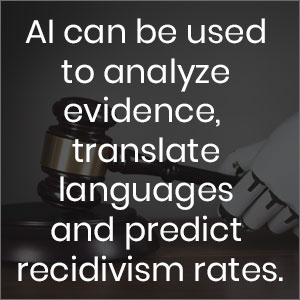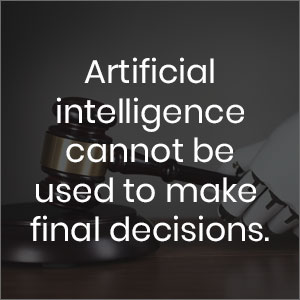Imagine going to court, and instead of seeing a judge wearing their cloak and holding their gavel, you see a robot ready to hear your case. Would you trust this machine to give you and your client a fair trial – one that could shape a whole life?
In a previous blog, we discussed artificial intelligence (AI) replacing people in the workforce, as humans will no longer be needed for everyday tasks. Here, we’ll look at AI in the courts, whether or not it’s a good idea for a machine to handle all judicial decisions and sentencing when it comes to legal issues, and answer the question, “will AI replace lawyers and judges?”
TRAINING ARTIFICIAL INTELLIGENCE TO AID LEGAL
Artificial intelligence is slowly beginning to aid legal professionals, law firms, and the overall legal industry. The consensus is that AI will one day be the norm in courtrooms, too. But not for a while.AI can be used to analyze evidence, translate languages and predict recidivism rates.
That’s because humans must train an AI machine in the first place. And to do that, humans must use historical evidence and data from precedent cases. But given that, historically, people have been more biased and discriminatory than not, the AI could easily become the same. So there are many steps that need to be taken – the first is training AI with unbiased and non-discriminatory data. This will ensure that the machine is not going to be in favor of one person over the other.
The second step after this machine learning is determining whether the machine is worth any further investment.
HOW AI IS USED IN THE JUSTICE SYSTEM: WILL REPLACE LAWYERS AND JUDGES?
Although AI cannot fully “replace” a judge or lawyer’s position at present, it is still useful in the courtroom in many ways. An AI machine can gather research, preventing the judge from having to go through legal books manually. Such legal technology is also able to address fundamental crises in courts by helping to make justice clear and efficient.
The great thing about AI and automation in courtrooms is that they save time. This especially helps people who cannot afford a lawyer or don’t have time for a court appearance. A good example of an AI in court is “Jury Chatbot” in Los Angeles, which is used for translation services and natural language processing.
Also, an AI machine is able to fill advisory roles like gathering evidence or estimating recidivism rates based on statistical data. This saves judges a tremendous amount of time. And, as we know, just about anything done manually is prone to error.
DOES AI HAVE THE POWER TO MAKE GOOD DECISIONS?
As stated above, an AI is trained with precedent cases. So, in essence, an AI is merely trained to think and act like past judges, who may have been prone to bias and discrimination. It cannot wholly learn the practice of law. It cannot be used to make final decisions until it is given proper and fair cases with which to train. Artificial intelligence cannot be used to make final decisions.
Yes, that also means that human judges need to act fairly and non-discriminatory today in order to prevent bias in AI somewhere down the line.
SO WILL AI REPLACE LAWYERS AND JUDGES?
It will take some time and continued research before legal tech – in the form of AI – becomes the rule as opposed to the exception in the courtroom. Underlying questions must first be addressed. Who will oversee the AI judges? What will take precedent: a human decision or an AI decision?
For now, though, artificial intelligence can be used in courts to analyze evidence, support decisions, translate languages, and predict recidivism rates. Their very presence in the legal system can still speed up the entire court process, which is beneficial to just about everyone.
As for the question, “will AI replace lawyers and judges?”, quite clearly, they will be needed for the foreseeable future.
Author:

Sajel Mistry
Connect with us on Linkedin











